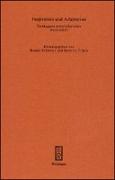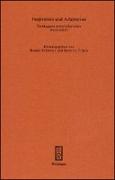| Artikelnummer | 9783615003604 |
|---|---|
| Produkttyp | Buch |
| Preis | 86,00 CHF |
| Verfügbarkeit | Lieferbar |
| Einband | Geheftet (Geh) |
| Meldetext | Libri-Titel folgt in ca. 2 Arbeitstagen |
| Autor | Schlesier, Renate / Trinca, Beatrice |
| Verlag | Weidmannsche Hildesheim |
| Weight | 0,0 |
| Erscheinungsjahr | 2008 |
| Seitenangabe | 178 |
| Sprache | ger |
| Anzahl der Bewertungen | 0 |
Inspiration und Adaptation Buchkatalog
Während mittelalterliche Theologen das Schöpfertum Gott allein vorbehalten wollen, beanspruchen Autoren weltlicher und religiöser Texte insbesondere ab dem 12. Jahrhundert mehr oder weniger explizit dieses Privileg für sich. Die Beiträge des vorliegenden Tagungsbandes zeigen, daß es sich dabei keineswegs um Brüche mit der Tradition handelt. Autorschaftsvorstellungen wie die Inspiration und das Wiedererzählen einer Vorlage werden in der lateinischen und in der volkssprachigen Literatur der Zeit übernommen und transformiert, so daß sie letztlich auktoriales Selbstbewußtsein und dichterische Autonomie zum Ausdruck bringen - trotz theologischer Verbote und der Poesiefeindlichkeit normativer Diskurse. Ein Ausblick auf die Renaissance, in der literaturtheoretische Schriften die Kreativität explizit bejahen, verweist durch den Kontrast zum einen auf die spezifisch mittelalterlichen Möglichkeiten der poetischen Produktion und Reflexion und zum anderen auf eine Autonomietradition, an die Renaissance-Denker anknüpfen konnten. While mediaeval theologians wanted the power of creation still to be defined as an attribute of God alone, authors of secular and religious texts, especially from the 12th century onwards, began to claim this privilege more or less explicitly for themselves. The conference papers published in this volume demonstrate that this was in no way a break with tradition. Conceptions of authorship such as inspiration and the retelling of material from a source were taken over in the Latin and vernacular literature of the time, and transformed it so that eventually authorial self-awareness and creative autonomy found an expression - despite theological bars and the anti-poetry stance in normative discourse. A look forward to the renaissance, when literary theory gave explicit approval to the idea of creativity, demonstrates by contrast both the specific mediaeval possibilities for poetic production and reflection, and a tradition of autonomy on which renaissance thinkers could draw.
86,00 CHF
Lieferbar



Dieser Artikel hat noch keine Bewertungen.